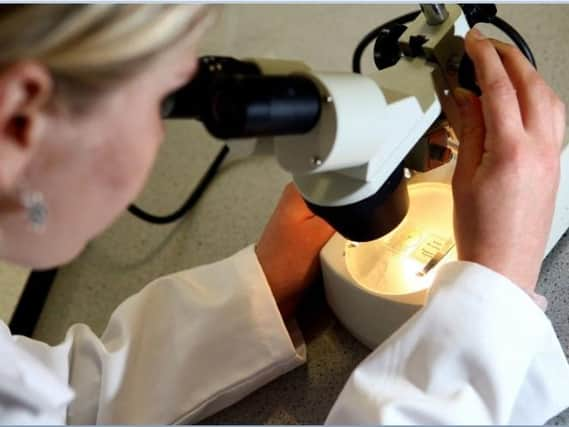Fears that lockdown will lead to increase in bowel cancer deaths, says study, as 550 fewer diagnoses in Yorkshire


The number of people diagnosed with bowel cancer in England has fallen sharply, with a deficit persisting up to October 2020, according to a University of Oxford study.
Urgent referral rates for suspected bowel cancer are starting to return to normal, but there are worries that the latest lockdown period will have an impact.
Advertisement
Hide AdAdvertisement
Hide AdResearchers say that as bowel cancer is more likely to be curable if it is detected at an early stage, these results may suggest that many patients, whose diagnosis has yet to be made, may die unnecessarily.
The study, part-funded by Yorkshire Cancer Research, shows that compared with an average month in 2019, during April 2020 at the peak of the first wave of coronavirus, referrals for suspected bowel cancer reduced by 62 per cent in Yorkshire, just shy of the national average of 63 per cent across England.
Just 13,440 patients nationwide were referred after seeing the GP, compared with 36, 274 in 2019.
The report also found that the number of colonoscopies performed fell by 92 per cent from 46,441 to 3,484, and the monthly number of people with confirmed bowel cancer referred for treatment fell by 22 per cent from 2,781 to 2,158.
Advertisement
Hide AdAdvertisement
Hide AdThe research published in The Lancet Gastroenterology and Hepatology further found that the number of operations in England performed fell by 31 per cent from 2,003 to 1,378.
Lead author Professor Eva Morris from the Nuffield Department of Population Health, University of Oxford, said: "These results reflect serious disruption in the normal identification and treatment of patients with bowel cancer.
"Early diagnosis is key to obtaining the best survival for bowel cancer so these delays in diagnosis are likely to have severe consequences on survival rates from the disease."
More than 90 per cent patients diagnosed with bowel cancer at stage one of the disease survive for at least five years, compared with only 10 per cent of patients diagnosed at stage four.
Advertisement
Hide AdAdvertisement
Hide AdThe research was carried out by a team of clinicians and academic researchers from across the UK, including from the University of Leeds and the University of Newcastle.
Professor Sir Mike Richards, a trustee of Cancer Research UK, said: "Far fewer patients with symptoms suggestive of bowel cancer were referred to hospital during the first wave of the pandemic.
"This may have been linked to fear about catching the virus and to the Government's call to 'stay at home' and 'protect the NHS'.
"Diagnoses and treatments were therefore delayed, with a likely adverse impact on cancer survival."
Advertisement
Hide AdAdvertisement
Hide AdThe study also suggests the first lockdown had a short-term impact on the numbers of people being treated.
But experts say the NHS managed to rapidly adapt services to deliver care safely.
They say treatment rates had only just returned to normal by October and, with the pressure the NHS is currently under as a result of a new surge in Covid-19 cases, it may be likely that diagnostic and treatment rates have fallen again.
The researchers are continuing to monitor these figures to inform decisions about treatment and help ensure that the issue of undetected and untreated bowel cancer in England is addressed.
Comment Guidelines
National World encourages reader discussion on our stories. User feedback, insights and back-and-forth exchanges add a rich layer of context to reporting. Please review our Community Guidelines before commenting.